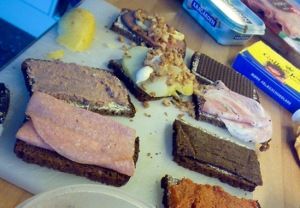News
Children should be more involved in making their own lunch, experts recommend
This article is more than 7 years old.
One area in which food waste could be reduced through planning and consultation is the lunch pack that most kids take to school every day

It looks appetising enough, but if you want it all to be eaten, let your kids have some input (photo: Steen Roar Hillebrecht)
If there is one thing that really divides the waters amongst school children, it is the packed lunch.
It is often a bone of contention at home as well, adding to the general stress level when Mum, Dad and the kids all have to get off to work and school in the mornings.
READ MORE: Still Adjusting: Back off rugbrød fascists
One thing is indisputable: it is usually Mum or Dad who ends up making it. A new survey carried out by the Arla Fund reveals that only 12 percent of Danish school children make their own lunch packs, reports TV2 Nyheder.
The survey also found that only 50 percent of the children felt sufficiently well-fed after lunch because a lot of them had not eaten all their food.
READ ALSO: Parents or schools – who should be responsible for school lunches?
“The lunch pack is an important source of energy for learning and play during a long school day. Parents really need to tackle this issue,” contended the report’s co-authors – Sanne Winther from the Arla Fund and Karen Wistoft, a professor in health sciences – in an opinion piece in Kristeligt Dagblad.
More consumer input needed
Their solution is to involve children far more in the making of their own lunch. This does not necessarily mean the children being totally responsible, but rather that they should take part in shopping, chopping the fruit and vegetables, buttering the bread and packing the lunch. They should also be involved in deciding what goes into the lunch pack.
“That is important because involving the children greatly increases the chance that the food will be eaten,” said Wistoft.
If parents are afraid that giving their children choice will mean a packed lunch full of unhealthy food such as Nutella or chocolate sandwiches, Wistoft’s experience shows otherwise.
“My advice to parents is that however busy their daily routine is, they talk about this with their children,” she added.










































